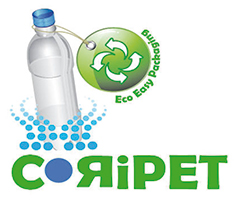CORIPET project for recycled PET
 On April 12 last, the Coripet consortium members submitted to the Italian Ministry of the Environment the application for permission to operate as a standalone system for the direct management of liquid food PET packaging, in fulfilment of the obligations under extended producer responsibility (EPR).
On April 12 last, the Coripet consortium members submitted to the Italian Ministry of the Environment the application for permission to operate as a standalone system for the direct management of liquid food PET packaging, in fulfilment of the obligations under extended producer responsibility (EPR).
Coripet (a private no-profit body) comprises six companies of the mineral water and soft drinks sector, which together account for 31% of product placed on the market (Ferrarelle SpA Lete SpA, Maniva SpA, Norda SpA and San Pellegrino SpA, Nestlè Waters group, together with the Drink Cup Srl, which produces water flagons), and three plastic recycling companies (Aliplast SpA, Dentis Srl and Valplastic SpA).
Among the nine consortium members’ objectives is “bottle to bottle”, or that is the closing of the PET bottles collection and recycling circle in Italy, in order to have recycled PET (RPET) that can be used for the production of liquid food packaging
The decision to establish itself as a standalone system, outside the CONAI circuit, has in particular been made in order to find a solution to Italy’s poor second life PET production for use as food packaging and, at the same time, to optimize collection and PET recycling (of about 400 thousand tons of PET packaging marketed in Italy in 2014, 200,000 t were not recycled but disposed of in landfills, incinerated or thrown away).
Collection and objectives.
One of the ways in which the Consortium aims to intercept post consumer bottles is that of smart eco compactors, placed in supermarkets throughout Italy, able to combine the traceability of the collection with user incentives.
These amounts will be added to the PET bottles from the traditional urban waste collection which Coripet intercept with the help of municipalities and towns that separate the plastic - as Corepla now does - on the basis of a framework agreement that the new Consortium aims to settle with the Association of Italian municipalities (ANCI), which will lead to an increase on current tariffs.
Since they do not derive from a traced collection, these materials do not meet EFSA food packaging production requirements, but can still be recycled and used to make many other types of articles.
All told, over the next five years, the consortium plans to intercept and send for recycling PET bottles amounting to 83% of the packaging placed on the market by the six mineral water company consortium members.

















